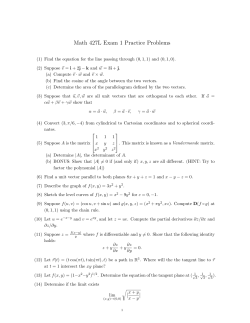
Homework 10
Math 151- Probability
Spring 2015 Jo Hardin
Homework 10
Assignment
[11] DeGroot, section 4.1
Suppose that the random variables X1 , . . . Xn form a random sample of size n from the uniform distribution
on the interval [0, 1]. Let Y1 = min{X1 , X2 , . . . Xn }, and let Yn = max{X1 , X2 , . . . Xn }. Find E[Y1 ] and
E[Yn ].
[10] DeGroot, section 4.2
Suppose that a fair coin is tossed repeatedly until a head is obtained for the first time.
1. What is the expected number of tosses that will be required?
2. What is the expected number of tails that will be obtained before the first head is obtained?
[2] DeGroot, section 4.3
Suppose that one word is selected at random from the sentence
THE GIRL PUT ON HER BEAUTIFUL RED HAT.
If X denotes the number of letters in the word that is selected, what is the value of V ar(X)?
[3] DeGroot, section 4.3 For all numbers a and b such that a < b, find the variance of the uniform distribution
on the interval [a, b].
[8] DeGroot, section 4.3
Construct and example of a distribution for which the mean is finite but the variance in infinite. (See if you
can find one that is different from your colleagues’!)
[4] DeGroot, section 4.4
Suppose that X is a random variable such that E[X 2 ] is finite.
1. Show that E[X 2 ] ≥ (E[X])2 .
2. Show that E[X 2 ] = (E[X])2 if and only if there is a constant c such that P r(X = c) = 1.
Hint: V ar(X) ≥ 0.
[8] DeGroot, section 4.4
Suppose X is a random variable for which the moment generating function (m.g.f.) is:
2
ψ(t) = et
+3t
−∞ < t < ∞.
,
Find the mean and the variance of X.
[R1] Let’s investigate the expected value of a Cauchy random variable. Recall, the distribution of X ∼
Cauchy is
1
fX (x) =
2π(1 + x2 )
Using R, generate many many samples. For each sample, generate many many observations.
1
(a) Empirically estimate the expected value. Find the mean of each sample and plot them in a histogram
(you should be plotting many x-bar values); then use the summary command to give a summary of
your simulated statistics.
(b) Empirically estimate the variance of the Cauchy. Find the variance of each sample and plot them in a
histogram (you should be plotting many variance values); then use the summary command to give a
summary of your simulated statistics.
(c) Give the empirical estimate of E[1/X]. Find the mean of one over each sample value and plot the
averages in a histogram (you should be plotting many average values); then use the summary command
to give a summary of your simulated statistics. (Note: you are not estimating 1/E[X].)
(d) What does the empirical sampling distribution of the mean (and other statistics) tell you (convince
you?) about E[X] being finite?
hint: you’ll need a for statement. And the command rcauchy will generate variable from a Cauchy distribution.
2
© Copyright 2025









